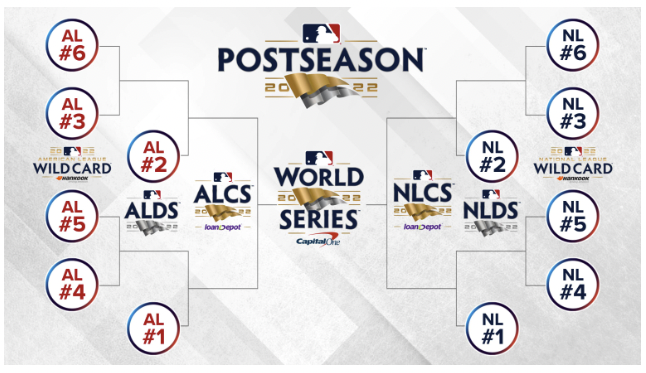The Major League Baseball (MLB) season is a thrilling time for baseball fans across the United States and around the world.
Have you ever wondered just how many games are played in an MLB season, including the playoffs?
There are 2,430 regular season games in an MLB season.
There is a potential of up to 53 total playoff games in an MLB season.
So, 2,483 games are possible in an MLB season.
In this article, we will explore in more detail the structure of the MLB season, the number of games played by each team, and the total number of games in a season, including the playoffs.
The Number of Games in an MLB Season
Let’s break down the number of games:
Regular Season
- Each of the 30 MLB teams plays 162 games in the regular season.
- Since two teams play against each other in each game, the total number of games is half of 30 multiplied by 162.
- games.
Wild Card Games
- There are 12 possible Wild Card games, four series for each league (American League and National League).
- Total: up to 12 games.
Division Series
- There are four Division Series, two in each league.
- Each Division Series is a best-of-5, so it can have a minimum of 3 games and a maximum of 5 games.
- In the maximum scenario: games.
ALCS and NLCS (League Championship Series)
- There are two Championship Series, one for each league.
- Each series is a best-of-7, so it can have a minimum of 4 games and a maximum of 7 games.
- In the maximum scenario: games.
World Series
- The World Series is also a best-of-7.
- In the maximum scenario: 7 games.
Total Number of Games in an MLB Season
Now, let’s add them up for the maximum scenario:
2,430 (regular season) + 12 (wild card) + 20 (divisional series) + 14 (ALCS/NLCS) + 7 (World Series) = games in total for the maximum scenario
The Structure of the MLB Season
The MLB season is divided into two leagues: the American League (AL) and the National League (NL).
Each league is further divided into three divisions: East, Central, and West.
Currently, there are 30 teams in the MLB, with 15 teams in each league.
The regular season typically begins in late March or early April and runs through September.
During this time, each team plays a total of 162 games.
These games are spread out over a period of approximately six months, with teams playing almost every day.
Number of Games Played by Each Team
During the regular season, each team in the MLB plays a total of 162 games.
This number has remained consistent since 1961 when the league expanded from 154 games to 162 games.
The purpose of playing such a large number of games is to ensure that teams have a fair chance to showcase their skills and determine the best teams for the playoffs.
Each team plays a mix of home and away games throughout the season.
The schedule is designed to ensure that teams play against all other teams in their league at least once during the season.
Additionally, teams play more games against divisional opponents to create a sense of rivalry and competition within the divisions.
Total Number of Games in a Season, Including Playoffs
Once the regular season comes to an end, the top teams from each division, as well as a few wild card teams, advance to the playoffs.
The MLB playoffs consist of a series of elimination rounds, including the Wild Card Game, Division Series, League Championship Series, and ultimately, the World Series.
The number of games played in the playoffs varies each year depending on the outcome of each series.
This includes the Wild Card Games (four best-of-3 series), Division Series (four best-of-five), League Championship Series (two best-of-seven), and the World Series (best-of-seven).

Therefore, when considering the regular season and the playoffs, the total number of games in an MLB season can range from 162 games for teams that do not make the playoffs to a maximum of 184 games (with 22 possible playoff games) for teams that play in the World Series.
MLB Playoffs and Variance
The MLB playoffs, as we noted in a different article, are often cited as having the most variance among the major four sports leagues in the US (NFL, MLB, NBA, NHL).
Here’s an explanation of why this is the case:
Length of Regular Season vs. Playoffs
The MLB regular season is a marathon, with each team playing 162 games.
This long season allows for the best teams to generally rise to the top over time, as the large sample size of games minimizes the impact of random events or “luck.”
In contrast, the MLB playoffs are a sprint.
Even with the addition of the Wild Card round, the Division Series is best-of-5, and the Championship Series and World Series are best-of-7.
This means a team can be eliminated after just three losses in the Division Series.
When you compare this to the 162-game regular season, the playoffs represent a tiny fraction of games played.
Nature of Baseball
Baseball is inherently a sport with a lot of variance.
The best teams might win only 60% of their games in the regular season, while in sports like basketball, top teams can win over 75% of their games.
This means that even the best baseball teams are accustomed to losing regularly, and in a short series, anything can happen.
Comparison to Other Leagues
The NBA and NHL both have best-of-7 series for all their playoff rounds.
While this is the same format as the MLB’s Championship Series and World Series, the NBA and NHL have more rounds that are best-of-7, which can reduce variance.
The NFL is a single-elimination format for its playoffs, which can introduce variance, but the nature of football, with fewer games in its regular season, means each game is more significant and teams are more accustomed to the “win or go home” mentality.
Pitching Dynamics
In baseball, pitching is a dominant factor, and teams can ride a hot pitcher (or a couple of them) deep into the playoffs.
In a short series, facing an elite pitcher twice can be a significant disadvantage.
This dynamic doesn’t have a direct parallel in the other major sports.
Home Field Advantage
While home-field advantage is a factor in all sports, its impact can be magnified in a shorter series.
In baseball, the team with home-field advantage only guarantees two home games in a best-of-5 series, which can be pivotal.
Summary
The MLB playoffs’ structure, combined with the inherent variance in baseball, leads to a postseason environment where upsets are more likely, and outcomes can be less predictable than in the other major US sports leagues.
This high variance relative to the regular season and other sports’ playoffs makes the MLB postseason particularly exciting and unpredictable.
Q&A – How Many Games in an MLB Season? (Including Playoffs)
1. How many games are played in the regular season?
The regular season consists of 162 games for each team in the MLB.
2. Why are there 162 games in the regular season?
The number of games was expanded from 154 to 162 in 1961 to allow for a more balanced schedule and to determine the best teams for the playoffs.
3. How many teams make it to the playoffs?
A total of 12 teams make it to the playoffs: 6 teams from the American League and 6 teams from the National League.
4. How many games are played in the Wild Card Game?
The Wild Card Game is a best-of-3 series, of which four series are played.
5. How many games are played in the Division Series?
The Division Series is a best-of-five series, meaning the first team to win three games advances to the next round.
6. How many games are played in the League Championship Series?
The League Championship Series is a best-of-seven series, meaning the first team to win four games advances to the World Series.
7. How many games are played in the World Series?
The World Series is a best-of-seven series, meaning the first team to win four games is crowned the champion.
8. How many total games can a team play in the playoffs?
If a team reaches the World Series, they can play a maximum of 22 games in the playoffs.
9. What happens if a regular season game is canceled?
If a regular season game is canceled due to weather or other unforeseen circumstances, it may be rescheduled or canceled altogether.
However, every effort is made to ensure that all 162 games are played.
10. How long does an MLB season last?
The regular season typically lasts from late March or early April through September, spanning approximately six months.
11. How many games do teams play against divisional opponents?
Teams play a higher number of games against divisional opponents to create a sense of rivalry and competition within the divisions.
12. How are the playoff teams determined?
The division winners from each league automatically qualify for the playoffs.
Additionally, four wild card teams from each league with the best records also advance to the playoffs.
13. How many games are played in the entire MLB season, including playoffs?
The total number of games in an MLB season can range from 162 games for teams that do not make the playoffs to a maximum of 184 games for teams that play in the World Series.
14. How many games are played in the World Series?
The World Series is a best-of-seven series, meaning a maximum of seven games can be played if necessary.
15. How many games are played in the entire playoffs?
The total number of games played in the playoffs varies each year depending on the outcome of each series.
Summary
The MLB season is a marathon of 162 games for each team, spread out over approximately six months.
The regular season determines the top teams from each division and the wild card teams that advance to the playoffs.
The playoffs consist of a series of elimination rounds, culminating in the World Series.
The total number of games in an MLB season, including the playoffs, can range from 162 games for teams that do not make the playoffs to a maximum of 184 games for teams that reach and play in the World Series.
The MLB season is a true test of skill, endurance, and determination for players and a source of excitement and joy for fans around the world.
Related


